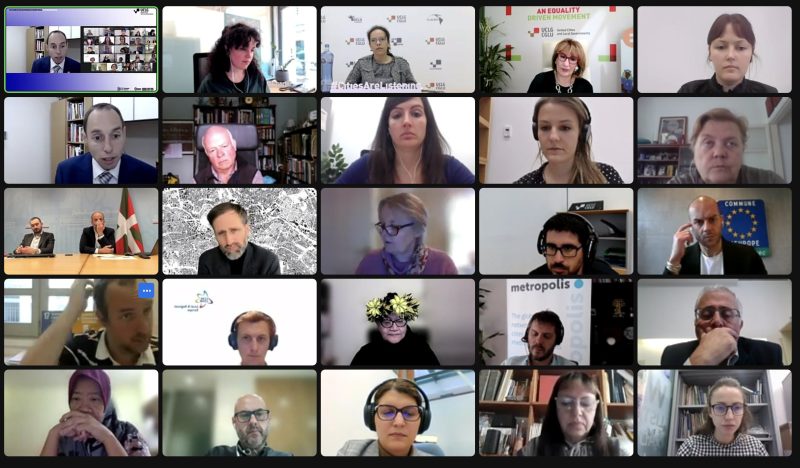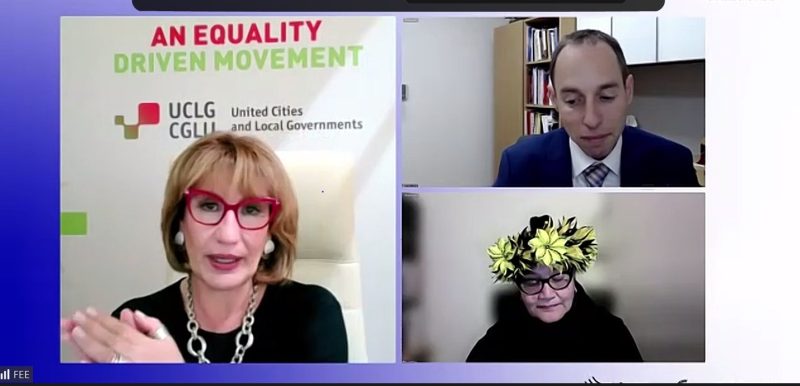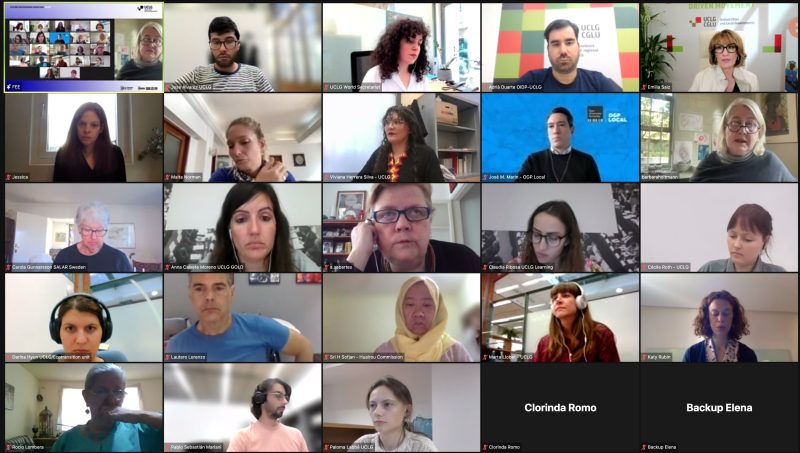Press Release FEE: Renewing the Governance Architecture
03.05.2023
UCLG’s Future Envisioning Exercises, which serve as a means to unfold the Pact for the Future, have been initiated by the UCLG Policy Councils. They are a space of dialogue and co-creation in which the UCLG political leadership, together with organized civil society and partners articulated in the UCLG Town Halls will build bridges to unfold the Pact.
During this session and the previous exercises held, the aim was to explore and discuss how the notion and implementation of the Commons, Finance, Trust, and Governance Architecture will contribute to how the Pact for the Future supports the revision of the 2030 Agenda by the UN General Assembly at the SDG Summit and the 2024 Summit of the Future, which will align with and support the Secretary-General’s “Our Common Agenda.”

Methodology of the Session
The exercise was introduced by UCLG Secretary-General Emilia Saiz, who laid out the importance of ensuring that local and regional governments (LRGs) have not only competences to face the current challenges, but also that the global decision-making tables include them to ensure that their voices are heard.
The section was structured into several segments: it began with a virtual consultation introduced by UCLG, which was based on the importance of transforming the current multilateral system to ensure that it meets the expectations and includes the views of the local spheres. It was followed by the concrete contributions from UCLG policy councilors, representatives of the UCLG Town Halls and stakeholders on key dimensions to the renewal of governance. Namely: the governance of emergencies; the role of LRG networks and the organized constituency of LRGs in transforming the decision-making tables; and the ways in which LRGs -and in particular the region of Euskadi and the city of Esteban Echeverría- are incorporating the universal agendas into local plans, uniting these two agendas at the local level. An in-focus segment allowed for partner organizations to express their understanding of involving local actors and communities in peacebuilding, to ensure conflicts are managed in a resilient manner
Participants delivered their vision of the shape that the international system will need to take before arriving at the Agora, the open dialogue space that allowed for sharing ideas and bringing together innovative policies that will be reflected in the Vision Document that will be published following the exercise.
Redefining the Governance Architecture as an entry point to the Pact for the Future
The entry points of the exercise were Dan Perell, Co-Chair of the Coalition for the UN We Need, and Pefi Kingi, Pacific Regional Focal Point for the Global Compact on Migration, aimed to challenge our understanding of the current multilateral system, pointing out its current inefficiencies and its crisis, all the while highlighting the ways in which it can be transformed to respond to the needs of communities, by arriving at the Summit for the Future with defined purposes and commitments, and bringing to the decision-making tables new ways of understanding development, growth, and human progress. The entry points also challenged the LRG constituency to continually engage with the civil society, to bring stakeholders to their own table, to build together the multilateral system of the future
“The SDGs have taken on a new layer of importance because of the call for the Summit of the Future. Engaging in this process entails a new degree of tension, and we are ready to rally academia, local and regional governments, and even individuals to transform governance” Dan Perell, Co-Chair of the Coalition for the UN We Need.
“Compassion would be an amazing ingredient to have in the repertoire of skills and strategy for what is required for change” Pefi Kingi, Pacific Regional Focal Point for the Global Compact on Migration, UCLG UBUNTU Advisor.

High-Impact Contributions – Commitments to transformation
The Contributions explored the link between the local sphere and global governance throughout the session. Phillip Rode, Executive Director of LSE-Cities, addressed the way in which UCLG, Metropolis and the London School of Economics-Cities had brought the governance of emergencies to the day-to-day work of local governments through the Emergency Governance Initiative. To then highlight the importance of coordinating between spheres of government to face crises, and called on national governments to let go of power, ensuring that LRGs own their own spaces when governing emergencies
“We need to support local and regional governments to develop spaces for implementation, to take risks. It is essential to empower them to avoid tensions, and ease conflicts. We need to think about spaces for local and regional governments at all levels, including at the UN Security Council” Philipp Rode, Executive Director, LSE-Cities
Lucy Slack, CLGF Secretary General, opened her Contribution with a reference to the close ties between LRGs and the communities that we represent, highlighting that it is this closeness the critical element that local governments bring to the table:“As a movement of LRGs we believe there is a strong role we can play bringing the voice of communities in the international fora, and we need that voice to be part of the decisions that will govern our lives. This is why we need to be at the table, and develop innovative mechanisms to ensure institutions respond to people’s needs”. Political will, she argued, is the key element lacking currently to acknowledging the potential of local governments as a partner in global development.
Asier Aranbarri, Director of Social Innovation, Basque Government General Secretariat for Social Transition and Agenda 2030 brought the ways in which the basque regional government was implementing the 2030 agenda in its territory, through linkages between the national, regional, and local spheres. He showcased the “Now” proposal, which is being taken to international fora, that calls for the upcoming SDG Summit to be a stage not just for national governments, but that it opens its doors to local and regional governments. This way, he argued, we will be able to develop a common process to deliver the SDGs: “Ultimately, it is about modeling the multi-level or multi-actor system and through it so that it can be used in other parts of the world. We act locally to also contribute globally.”
Fernando Gray, Mayor of Esteban Echeverría, and Vice President of UCLG for Latin America, highlighted that renewal of governance needs to closely address the rise in inequalities; it needs to acknowledge the transformative potential of women and girls; and it needs to protect and foster rights and services to ensure no-one is left behind. In his words: “We need to be responsible for the democratic life in our cities. This way, our voice in the global decision-making tables will truly visibilize the needs and demands of our communities”
The in-focus segment of the exercise brought to light the crisis of the multilateral system, and how it has deviated from its original intent to showcasing the interest of national governments. Karishma Rajoo, General Manager, Programmes, ACCORD, called on the multilateral system to look at the opportunities arising from the local level, to build on the understanding of local actors in areas such as peacebuilding, and to bring to the table young people, and those left behind, to build peace and localize the goals.
“There is a crisis of multilateralism. The crisis of this system has been many years in the making, so the conversation around this is critical. There is still a need for international dialogue at many levels: how this system adapts and changes needs to be explored” – Karishma Rajoo, General Manager: Programmes, ACCORD

The Agora: Local voices to advance the redefinition of the Governance Architecture
The Agora segment, in which participants built on the ideas shared by the contributions, was introduced by Viviane Ogou, from the UCLG Youth Caucus, who introduced to speakers the ideas of transforming our understanding of peace, and whether the “transformation” of our systems includes new ways of governing.
Throughout the Agora, participants such as Béchir Odeimi, Director of United Cities of Lebanon introduced the challenges of areas hit by conflict, and how centralization and lack of co-governance hurts cities and regions all the more in these areas. He called for a greater involvement of local governments in multilateral conversations, especially in emergencies and conflict. Paulo Illes, coordinator of Migrations of the Brazilian Government, argued for how cities and the ways in which they include migrants are able to pave the way for national and international management of migrations, as was the case with Sao Paulo. It is critical to build on these alliances to ensure that we think about models in an integrated way.
Throughout the Agora, participants argued for the need to involve intermediary cities as spaces of singular proximity with citizens; the need to involve marginalized communities, differently abled populations, and the youth in local governance to raise their voices towards the international sphere; and the ways in which the local government constituency can build its ties with the UN system.
The UCLG Future Envisioning Exercise wrapped up with the commitment to continue the conversations that have been kickstarted with the exercises held on the Commons, Finance and the Economy, Trust and Governance as entry points for the global transformation we need.